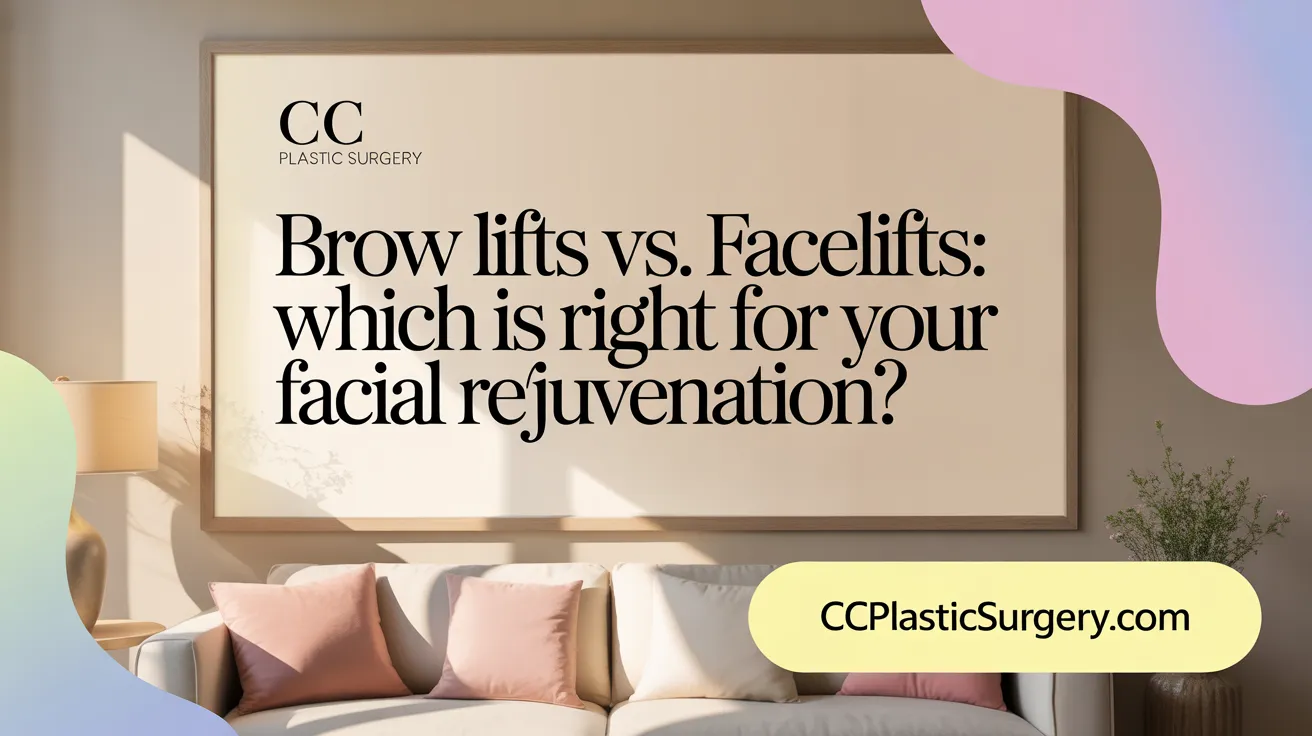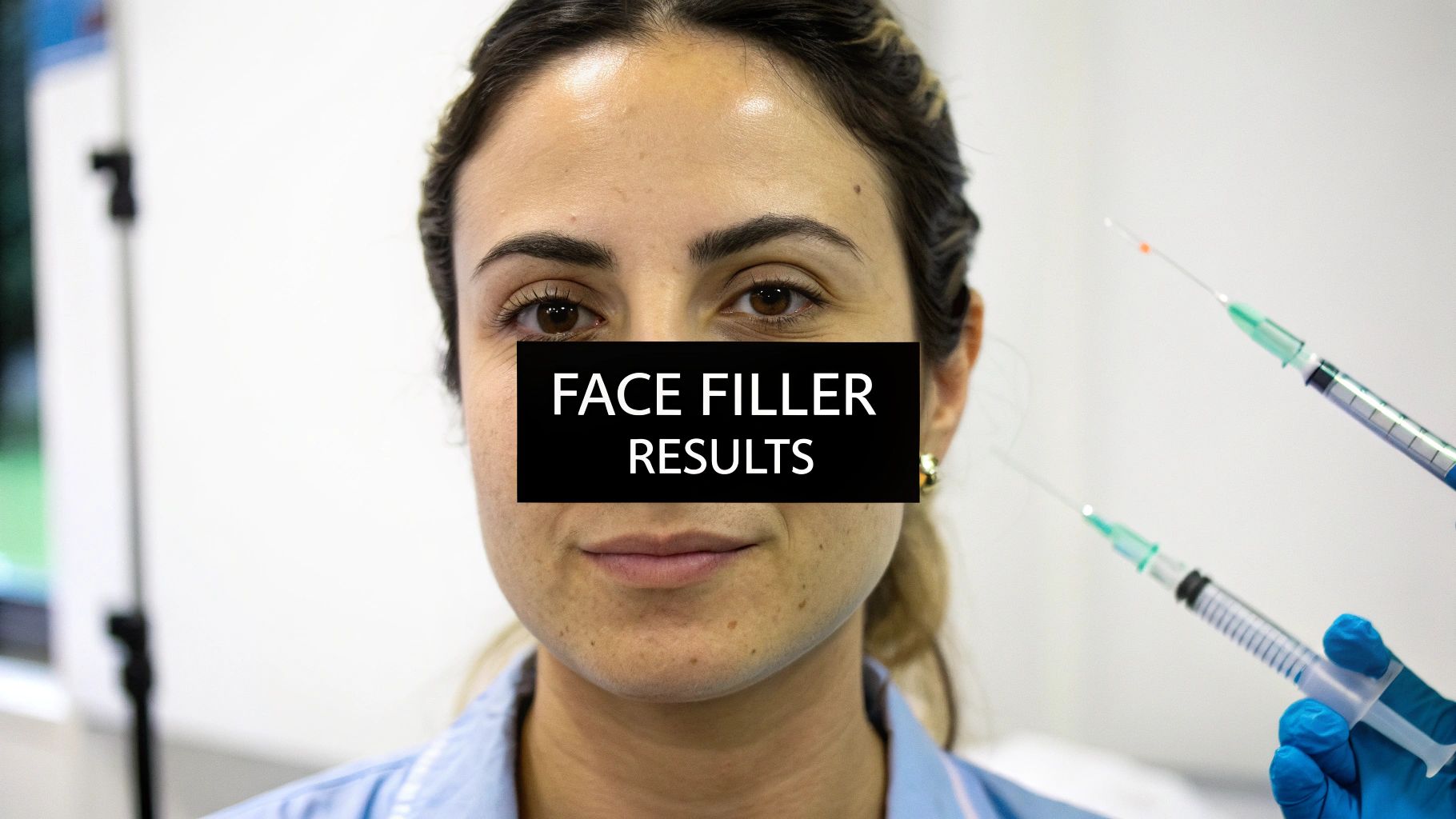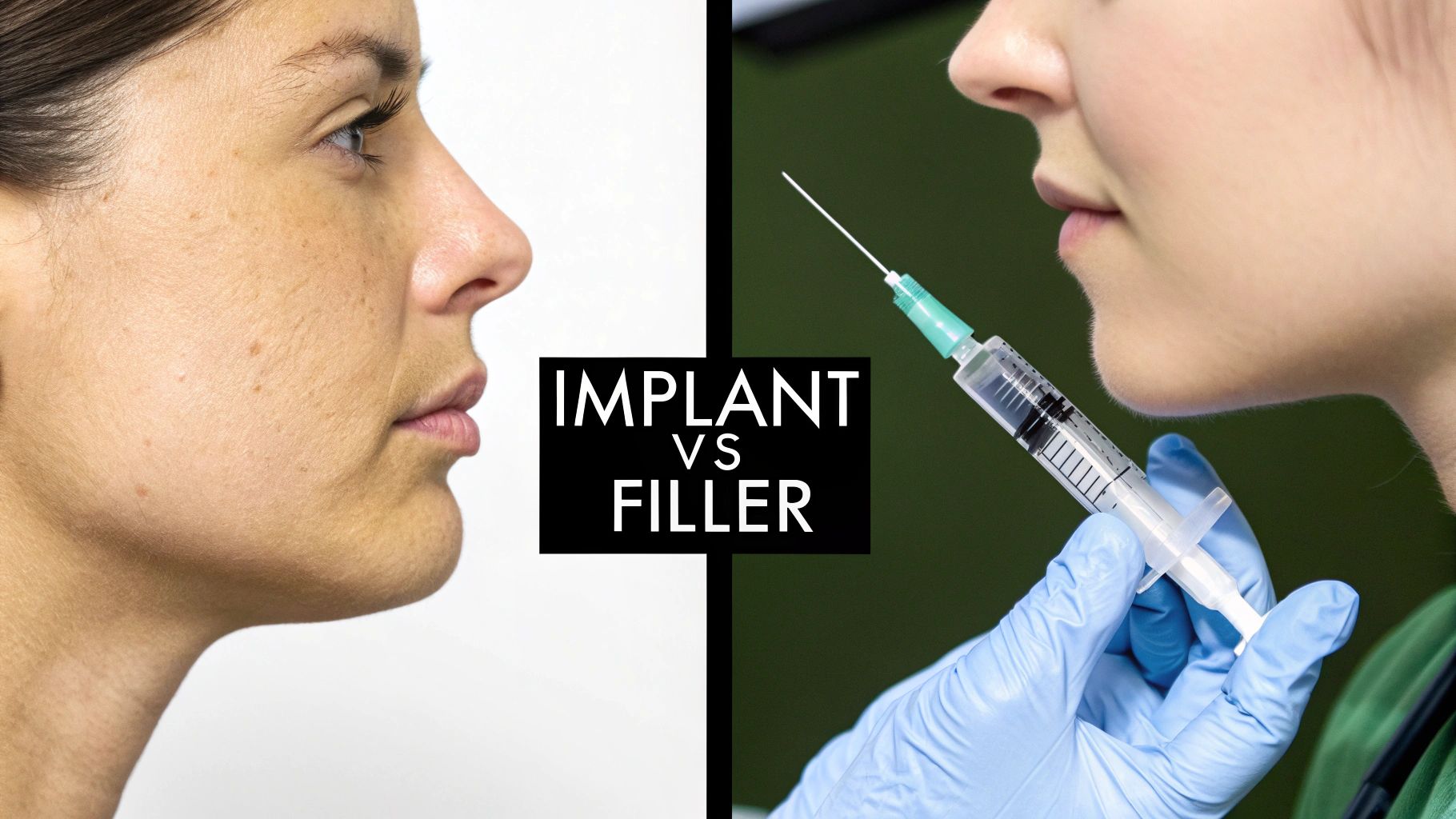
February 6, 2026
How Long Does Morpheus8 Last and Is It Worth It
How long does Morpheus8 last? Explore the longevity of results, key influencing factors, and expert tips for maximizing your skin rejuvenation investment.
Sep 16, 2025

Brow lift surgery, often called a forehead lift, is a targeted cosmetic procedure designed to elevate sagging eyebrows, smooth out forehead wrinkles, and reduce frown lines. This surgical intervention not only refreshes the upper face but also enhances the eyes by lifting drooping skin that can cause a tired or aged appearance. Brow lifts are increasingly popular for those seeking to restore a more youthful, awake, and balanced look without altering the natural shape of the eyes themselves. This article explores the procedure’s nuances, candidate suitability, methods, benefits, recovery, and how it compares to other facial surgeries.

A brow lift, also called a forehead lift, is a surgical operation designed to elevate sagging eyebrows and smooth out forehead lines. This procedure helps create a more youthful, awake, and refreshed appearance. By repositioning the muscles and removing excess skin in the forehead area, it opens up the eye region, instantly making the eyes look brighter and less tired.
During surgery, incisions are usually made behind the hairline or within the hair to ensure hidden scarring. The surgeon lifts and repositions the underlying tissues, which reduces wrinkles and elevates drooping eyebrows. This results in a naturally more alert and pleasant expression.
A major benefit of a brow lift is the enhancement of the upper face’s appearance. When eyebrows are lifted into a more youthful position, the upper eyelids are also supported better, which can sometimes lift hooded or drooping eyelid skin. This opens up the eye area, improving vision in some cases and making the eyes appear larger and more vibrant.
By addressing sagging brows and forehead wrinkles, the procedure diminishes signs of aging that cause a tired, angry, or serious look. The overall effect is a brighter, more approachable gaze that restores a sense of vitality.
A brow lift can correct several aging signs in the upper face, including:
These improvements help create a more harmonious facial balance and can restore a more expressive and natural appearance. The lift not only rejuvenates the eye area but also contributes to an overall look of alertness and positivity.
While a brow lift significantly improves the eyebrows, forehead, and upper eyelid support, it does not change the fundamental shape or size of the eyes themselves. The surgery does not directly modify the eye’s structure, eyelid shape, or the presence of baggy eyelids.
For issues like eyelid hooding or excess skin that significantly affect the eyelids, additional procedures such as eyelid surgery (blepharoplasty) are usually recommended. It is important for patients to have realistic expectations, understanding that a brow lift enhances the upper face’s appearance and eye brightness but does not reshape the eyeballs or alter their natural shape.

A good candidate for a brow lift typically shows signs of aging such as sagging or drooping eyebrows, deep horizontal forehead lines, and vertical furrow lines, often called '11s', between the eyebrows. These features can create a tired or angry appearance, which many seek to correct. An ideal candidate usually has good skin elasticity, allowing the skin to tighten effectively after the procedure. They should also have a balanced facial structure that complements the surgical adjustments.
While most candidates are between 40 and 60 years old, younger individuals experiencing premature aging or genetic predispositions to sagging may also be eligible. It’s important that candidates are in good overall health, free of conditions that impair healing such as uncontrolled diabetes or bleeding disorders. Non-smokers are strongly preferred, as smoking significantly reduces wound healing capacity. Candidates should also avoid blood thinners or other medications that increase bleeding risk before surgery.
Candidates must have realistic goals regarding the results of their brow lift. The procedure aims to elevate the brows, smooth forehead wrinkles, and improve a tired or aged appearance. It does not, however, address issues like skin texture, facial volume loss, or dynamic wrinkles caused by facial expressions. Surgeons assess the individual’s facial anatomy to determine if a brow lift will produce harmonious, natural-looking results. Those with severe skin laxity or extensive facial aging may benefit from combined procedures like a facelift.
In some cases, drooping eyebrows can obstruct the upper or outer parts of the visual field, interferes with vision, or contributes to eyelid hooding. For these individuals, a brow lift can provide significant functional benefits by lifting the eyebrows to improve vision and comfort. Alongside enhancing appearance, the procedure can restore a more alert, awake look, boosting confidence and overall facial harmony.
| Candidate Traits | Age Range | Additional Factors | Expected Outcomes |
|---|---|---|---|
| Sagging eyebrows | 40-60 years | Good health, non-smoker | Youthful, alert appearance |
| Forehead wrinkles | Younger and older | Realistic expectations | Smoother forehead, uplifted brows |
| Deep furrows | All ages | Suitable facial anatomy | Restored facial balance |
| Vision obstruction | Often over 50 | Healthy with no serious medical issues | Improved vision, refreshed look |

A brow lift, also known as a forehead lift, provides a variety of aesthetic and functional benefits. The procedure primarily aims to lift sagging eyebrows and smooth out forehead wrinkles, creating a more youthful and rested appearance. Patients often notice an improvement in facial harmony as the procedure reduces horizontal forehead lines, vertical frown lines ('11s'), and drooping eyebrows that can make expressions look tired, angry, or serious.
Beyond cosmetic enhancement, a brow lift can also improve vision. Sagging eyebrows and excess skin on the eyelids may obstruct sight, especially in the upper or outer visual fields. Raising the eyebrows can lift the eyelids, increasing eyelid support and potentially restoring a clearer field of vision.
Patients generally enjoy a natural, refreshed look that brightens the upper face. The results tend to last a lifetime, although being mindful of aging and skin care can help prolong the benefits. Many experience boosted self-confidence and a more positive outlook, as the procedure reduces signs of aging and balances facial features.
While the surgery offers substantial benefits, it is not without risks. Possible complications include scarring, asymmetry, nerve injury, or hair loss around incision areas. Skilled surgeons work to minimize these risks, ensuring that patients achieve natural and harmonious outcomes.
Overall, brow lift surgery can produce a significant transformation—making a person's expression more alert and approachable, diminishing visible signs of aging, and enhancing overall facial aesthetics.

Brow lift procedures utilize a range of techniques tailored to the patient’s specific needs and facial anatomy. These methods include both traditional surgical approaches and non-invasive options.
Surgical techniques vary significantly based on incision placement and tissue manipulation. The classic coronal brow lift involves an incision made across the scalp behind the hairline, allowing surgeons to lift and reshape the forehead and eyebrows. The endoscopic technique uses smaller incisions hidden within the scalp, enabling a less invasive lift through the use of a camera-guided instrument.
Other approaches include the direct brow lift, where incisions are placed just above the eyebrow to directly elevation, and the lateral or temporal brow lift, which targets only the outer portions of the eyebrows. The trichophytic or pretrichial lifts make incisions within or just at the hairline to optimize concealment of scars.
Muscle and tissue adjustment strategies are also common. Internal browpexy involves suspending the brow upward from inside the scalp, and glabellar myoplasty targets muscles responsible for frown lines, relaxing them for a smoother forehead. Tissue suspension techniques, such as sutures or suspensory devices, provide a less invasive option to lift and stabilize the brow.
Beyond surgery, non-surgical alternatives like Botox are used to temporarily elevate the brow. Botox injections modify muscle activity, smoothing out wrinkles and lifting the eyebrows subtly when surgical options are unnecessary or not desired.
The choice of technique takes into account individual factors like skin quality, hairline, facial asymmetry, and patient goals. Surgeons with expertise in various methods can personalize treatment plans to deliver natural, balanced, and lasting rejuvenation with minimal visible scarring and optimal aesthetic outcomes.

Brow lift surgery primarily concentrates on the upper part of the face. It aims to elevate sagging eyebrows, reduce forehead lines, and diminish vertical frown lines. This procedure helps open up the eye area, giving a brighter and more alert appearance.
On the other hand, facelifts are designed to address signs of aging in the middle and lower face. They target sagging cheeks, jowls, and loose skin around the jawline and neck. The focus is on tightening and lifting these areas to restore a youthful contour.
Both procedures fall under facial rejuvenation but serve different purposes. A brow lift is ideal for those with prominent forehead wrinkles or drooping brows, while a facelift is better suited for individuals with significant sagging in the lower face and neck.
Sometimes, these treatments are combined for a comprehensive facial refresh. For instance, a patient with both drooping brows and sagging jowls may benefit from simultaneous brow lift and facelift surgeries.
Choosing the right procedure depends on specific aging concerns and personal goals. A tailored approach by a qualified surgeon ensures natural, balanced results.
Combining a brow lift with a facelift can produce harmonious facial rejuvenation. It targets multiple aging signs, creating a refreshed and natural look. This integrated approach often minimizes the need for revision surgeries in the future.
An individualized consultation helps determine the most appropriate treatment plan. Factors considered include age, skin elasticity, area of concern, and overall facial structure.
In summary, while brow lifts and facelifts target different regions with distinct goals, they can be effectively combined for a comprehensive transformation. Each procedure complements the other, resulting in a balanced and youthful appearance.
A brow lift is often sought not only for its cosmetic benefits but also for its ability to improve vision-related issues. Sagging eyebrows and horizontal forehead lines can give a tired, angry, or serious appearance, diminishing facial expressiveness. By elevating the eyebrows, the procedure restores a more youthful and alert look, enhancing overall facial harmony.
It also helps lift the upper eyelids, which may droop over the eyes and interfere with vision. This dual benefit makes the brow lift a versatile option for patients who wish to improve their appearance while also addressing potential visual field obstructions caused by facial aging signs.
Drooping eyebrows can block the upper or outer parts of a person's visual field. When the brows are lifted through surgery, it can open up the eye area, improving peripheral vision. This aspect is particularly important for individuals experiencing functional impairment due to sagging skin or eyelid hooding.
Improved vision might be a secondary benefit, but it significantly boosts quality of life, especially for patients whose daily activities are affected by their visual limitations. It exemplifies how a cosmetic procedure can also serve functional purposes.
Successful outcomes rely heavily on precise surgical technique and appropriate patient selection. An experienced surgeon carefully evaluates individual facial anatomy, skin quality, and patient goals to determine the ideal approach, whether endoscopic, coronal, or other techniques.
Selecting suitable candidates—those in good health, with realistic expectations, and without significant facial volume loss—is crucial to avoid dissatisfaction and complications.
Surgical precision ensures the natural elevation of the brows, preserves facial expression, and minimizes risks such as scarring or asymmetry. Tailoring the procedure to the unique needs of each patient leads to harmonious and long-lasting results.
When performed correctly, a brow lift can effectively meet both aesthetic and functional goals. Patients generally seek a refreshed, more alert appearance along with improvements in vision and facial expressions. Clear communication between the surgeon and patient about expectations, potential risks, and postoperative care helps align the outcome with individual desires.
Overall, brow lift surgery, when approached with careful planning and expert execution, offers a comprehensive solution that enhances facial beauty and function alike.
Recovery after a brow lift generally involves a period of swelling, bruising, numbness, and some mild discomfort. These symptoms are normal and typically improve within the first two weeks following the procedure.
During this time, patients are advised to keep their head elevated as much as possible, especially during sleep, to help reduce swelling. Applying cold compresses can also alleviate swelling and discomfort. Patients should avoid strenuous activities, heavy lifting, and bending over for at least four to six weeks to allow proper healing.
Most incisions are placed within the hairline or behind the ears, which helps camouflage scars. Over time, these scars fade over several months, and the final, refined results can be appreciated within a year.
While recovery progresses smoothly for most, there are potential risks. These include infection, visible scarring, asymmetry, nerve or tissue injury, and unwanted changes in eyebrow or eyelid movement. Such risks are minimized through proper postoperative care and routine follow-up appointments.
Regular visits to the surgeon are essential for monitoring healing progress, managing any complications early, and optimizing the final aesthetic outcome. Patients should also follow their surgeon’s instructions regarding wound care, activity restrictions, and hygiene to support a smooth recovery.
When considering a brow lift, reviewing before-and-after photos plays a crucial role in evaluating potential results. These images provide concrete visual proof of what the procedure can achieve, helping individuals understand the possible improvements in their appearance.
In these photos, look for noticeable changes such as the elevation of the eyebrows, smoothing of forehead lines, and a more youthful, alert look. Pay attention to how the skin appears tighter, the reduction in frown lines ('11s'), and the overall harmony of facial features. Comparing multiple cases can give you an idea of the variability and consistency of results.
Official medical society galleries and licensed plastic surgeons’ portfolios are reliable sources for these images. These photos are often taken under standardized conditions, ensuring that they accurately reflect the outcomes of different techniques like endoscopic, coronal, or limited incision brow lifts. It’s important to view images from reputable sources to ensure authenticity.
By examining a variety of before-and-after photos, prospective patients can set appropriate expectations. Not every case will look identical, as factors such as age, skin elasticity, and individual anatomy influence results. Observing a range of outcomes helps clarify what improvements are typical and achievable, fostering informed and realistic expectations.
| Aspect to Observe | Typical Result | Additional Notes |
|---|---|---|
| Eyebrow position | Increased elevation | Shows correction of sagging brows |
| Forehead lines | Reduced wrinkles | Indicates skin smoothing |
| Overall facial brightness | More youthful look | Reflects overall rejuvenation |
Ultimately, these visual comparisons support better decision-making and help individuals feel more confident about their choice of undergoing a brow lift.
A brow lift aims to rejuvenate the face without compromising natural expressions. Surgeons emphasizing a conservative approach prioritize precise lifting that respects the patient’s unique facial anatomy. This careful method reduces the risk of over-elevation, which can lead to an unnatural or surprised appearance. By avoiding overly aggressive tissue removal, the surgeon preserves the natural shape and function of the brows and forehead.
Achieving a balanced look involves lifting the brows to a position that restores a youthful yet natural appearance. Surgeons carefully determine the optimal height, ensuring the brows are not overly arched or flattened. They also focus on preserving the natural horizontal and vertical lines of the face, aligning the lift with the patient’s natural anatomical vectors. This approach produces results that look harmonious and avoid the “stiff” or “plastic” look often associated with overdone lifts.
Over-elevation can occur if the brow is raised too high, creating a surprised or startled expression. Skilled surgeons utilize precise incision placement and controlled tissue handling. They often lift only to the point where the forehead appears refreshed but still maintains the natural curvature and expression of the eyebrows. Artistic judgment and experience are essential in fine-tuning the elevation, preventing an unnatural or tense look.
Every face has unique features and proportions. A tailored approach considers the patient’s current brow position, skin quality, hairline, and facial expressions. Customizing the procedure ensures that the lift complements the patient’s overall facial harmony and personal goals. This individualized planning results in natural-looking results that enhance confidence and satisfaction.
| Technique | Focus Area | Result | Notes |
|---|---|---|---|
| Conservative lifting | Avoids over-elevation | Natural brow position | Ensures natural expression |
| Precise incision placement | Maintains natural lines | Reduces scarring | Tailored to anatomy |
| Patient-specific planning | Harmonious results | Personalized outcome | Based on goals and features |
By integrating these principles, surgeons can deliver results that not only rejuvenate the brow area but also preserve the patient’s natural facial expression, creating a refreshed, lively appearance without the artificial look.
Many patients seeking a brow lift also consider other cosmetic procedures to achieve a thoroughly refreshed and natural look. Combining a brow lift with eyelid surgeries, facelifts, or fat transfers can target broader aging signs and provide more comprehensive results.
Eyelid surgery, also known as blepharoplasty, can be combined with a brow lift to address sagging eyelids and baggy skin around the eyes. This tandem approach lifts the brows and tightens the eyelids, opening up the eye area and enhancing overall facial brightness.
A facelift can complement a brow lift by rejuvenating the lower face and neck, creating harmony between the upper and lower facial features. While the brow lift targets the forehead and eye area, a facelift smooths jowls, tightens the neck, and reduces deep lines.
Fat transfer procedures may also be paired with brow lifts to restore volume lost through aging. Injecting fat into areas like the cheeks and temples can soften hollowed features, enhancing the youthful appearance achieved by elevating the brows.
Advantages of combining multiple procedures include reducing overall recovery time, ensuring harmonious results, and addressing various signs of aging in one comprehensive plan. This holistic approach often results in a more natural and balanced facial rejuvenation.
Customized treatment strategies are essential. A skilled surgeon assesses individual facial anatomy, aging patterns, and personal goals to develop a tailored plan. This personalized approach maximizes aesthetic outcomes and satisfies patient expectations.
In summary, integrating brow lifts with other facial procedures allows for a more complete rejuvenation, addressing multiple aging concerns simultaneously. For those interested in exploring these options, searching "brow lift combined cosmetic procedures" can provide valuable insights and options for personalized facial enhancement.

Brow lift surgery, while generally safe when performed by qualified surgeons, carries certain risks. The most common include visible scarring, infection, and asymmetry of the eyebrows or forehead. Swelling, bruising, and numbness are also typical during the recovery phase.
Infection can occur if the incision sites are not kept clean, but this is rare with proper postoperative care. Scars tend to be well-hidden within the hairline or natural skin creases, especially when surgeons use concealment techniques.
Nerve injury is a potential risk, particularly if nerves are affected during muscle or skin repositioning. Although most nerve issues are temporary, some patients may experience lingering numbness or altered sensation.
Hair loss around incision areas can happen due to trauma to hair follicles during surgery. Fortunately, such hair loss is usually temporary and can be minimized by experienced surgeons who plan incisions carefully.
Selecting a board-certified plastic surgeon is crucial for minimizing risks. These surgeons have specialized training, extensive experience, and adhere to strict safety standards. Certification ensures they are skilled in performing various brow lift techniques with attention to detail.
Experienced surgeons employ several strategies to enhance safety and results:
Through these methods, surgeons aim for natural-looking results with minimal downtime and complications.
| Risks | Description | Prevention/Tips |
|---|---|---|
| Scarring | Visible scars at incision sites | Use of hidden incisions, skilled suturing |
| Infection | Bacterial infection at surgical site | Antibiotic prophylaxis and proper wound care |
| Asymmetry | Uneven eyebrows or forehead position | Precise surgical planning and intraoperative adjustments |
| Nerve Damage | Altered sensation or numbness in forehead or scalp | Anatomical knowledge and careful dissection |
| Hair loss | Temporary or permanent hair thinning near incision points | Incisions within hairline, gentle tissue handling |
Understanding these risks and working with an experienced, certified surgeon can significantly increase the likelihood of successful, natural results from your brow lift surgery.
A well-performed brow lift can provide permanent improvements, often lasting a lifetime. However, natural aging processes such as gravity and skin elasticity decline can gradually diminish these results over time. To maximize longevity, maintaining a healthy skin and lifestyle is essential.
Protecting your skin from sun damage is crucial in preserving your youthful appearance. Regular application of broad-spectrum sunscreen, wearing protective clothing, and avoiding excessive sun exposure help prevent premature aging, skin thinning, and pigmentation changes. Using quality skincare products with antioxidants and moisturizers can also support skin health.
Eating a balanced diet rich in vitamins and staying hydrated encourages healthy skin. Avoiding smoking and limiting alcohol intake improves skin quality and healing capacity. Routine exercise boosts circulation, which benefits skin tone and elasticity.
Certain habits can threaten your facial rejuvenation. Excessive facial expressions that involve dynamic muscle movements may create new lines over time. Repetitive actions like frowning or squinting contribute to wrinkle formation. Additionally, neglecting sun protection or engaging in smoking can accelerate aging and compromise your results.
By adopting a skincare routine, protecting yourself from the sun, and maintaining a healthy lifestyle, you can enjoy the long-lasting benefits of your brow lift and keep your appearance youthful and refreshed.
Brow lift surgery stands as a powerful option for those seeking to rejuvenate their upper face, lift sagging brows, and brighten the eyes with natural, youthful results. By carefully selecting candidates, tailoring surgical techniques, and prioritizing an artistic approach, expert surgeons can deliver significant aesthetic and functional benefits. Recovery, while involving manageable risks, leads to long-lasting improvements in appearance and confidence. When combined judiciously with other cosmetic procedures, brow lifts contribute to a harmonious facial balance that enhances personal fulfillment. Prospective patients benefit greatly from reviewing real outcomes and consulting trusted professionals to set realistic expectations and achieve their desired transformation.

February 6, 2026
How long does Morpheus8 last? Explore the longevity of results, key influencing factors, and expert tips for maximizing your skin rejuvenation investment.

February 5, 2026
Explore stunning lower face fillers before and after transformations. See real results for jawline, chin, and marionette lines and learn how they work.

February 4, 2026
Explore our expert chin implant vs filler comparison. We analyze longevity, results, recovery, and cost to help you choose the right chin augmentation.